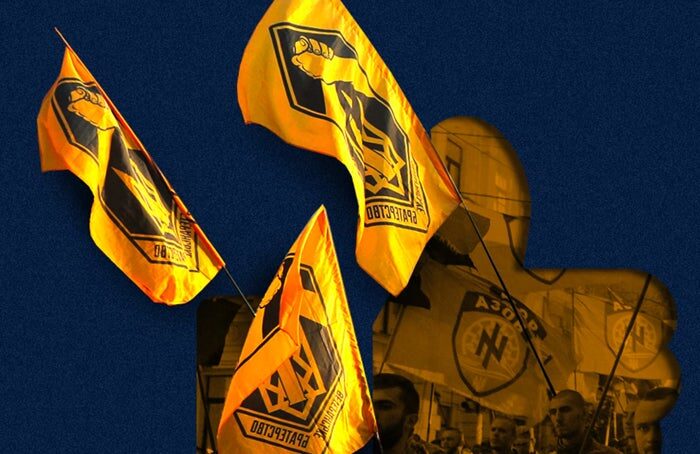Det politiske skift, der blev foretaget i denne uge, er knyttet til den igangværende russiske invasion af Ukraine og forudgående militære optrapninger. Azov-bataljonen, der fungerer som en bevæbnet fløj af den bredere ukrainske hvide nationalistiske Azov-bevægelse, begyndte som en frivillig anti-russisk milits, før den formelt sluttede sig til den ukrainske nationalgarde i 2014; regimentet er kendt for sin hardcore højreorienterede ultranationalisme og den nynazistiske ideologi, der er gennemgående blandt dets medlemmer.
Selvom den i de senere år har nedtonet sine nynazistiske sympatier, er gruppens tilhørsforhold ikke subtile: Azov-soldater marcherer og træner iført uniformer, der bærer ikoner fra Det Tredje Rige; deres ledelse har angiveligt bejlet til amerikanske alt-right og nynazistiske elementer; og i 2010 udtalte bataljonens første chef og en tidligere ukrainsk parlamentariker, Andriy Biletsky, at Ukraines nationale formål var at 'lede verdens hvide racer i et sidste korstog ... mod semitledede Untermenschen [undermennesker].' Med russiske styrker, der angiveligt bevæger sig hurtigt mod mål i hele Ukraine, sætter Facebooks sløve, listebaserede tilgang til moderation virksomheden i klemme: Hvad sker der, når en gruppe, som du har anset for at være for farlig til frit at diskutere, forsvarer sit land mod et fuldskala angreb?
Kommentar: Delvist oversat af Sott.net fra Facebook allows praise of Neo-Nazi Ukrainian battalion if it fights Russian invasion
According to internal policy materials reviewed by The Intercept, Facebook will
"allow praise of the Azov Battalion when explicitly and exclusively praising their role in defending Ukraine OR their role as part of the Ukraine's National Guard."Internally published examples of speech that Facebook now deems acceptable include
"Azov movement volunteers are real heroes, they are a much needed support to our national guard"; "We are under attack. Azov has been courageously defending our town for the last 6 hours"; and "I think Azov is playing a patriotic role during this crisis."The materials stipulate that Azov still can't use Facebook platforms for recruiting purposes or for publishing its own statements and that the regiment's uniforms and banners will remain as banned hate symbol imagery, even while Azov soldiers may fight wearing and displaying them. In a tacit acknowledgement of the group's ideology, the memo provides two examples of posts that would not be allowed under the new policy:
"Goebbels, the Fuhrer and Azov, all are great models for national sacrifices and heroism" and "Well done Azov for protecting Ukraine and it's white nationalist heritage."In a statement to The Intercept, company spokesperson Erica Sackin confirmed the decision but declined to answer questions about the new policy.
Azov's formal Facebook ban began in 2019, and the regiment, along with several associated individuals like Biletsky, were designated under the company's prohibition against hate groups, subject to its harshest "Tier 1" restrictions that bar users from engaging in "praise, support, or representation" of blacklisted entities across the company's platforms. Facebook's previously secret roster of banned groups and persons, published by The Intercept last year, categorized the Azov Battalion alongside the likes of the Islamic State and the Ku Klux Klan, all Tier 1 groups because of their propensity for "serious offline harms" and "violence against civilians." Indeed, a 2016 report by the Office of the United Nations High Commissioner for Human Rights found that Azov soldiers had raped and tortured civilians during Russia's 2014 invasion of Ukraine.
The exemption will no doubt create confusion for Facebook's moderators, tasked with interpreting the company's muddled and at time contradictory censorship rules under exhausting conditions. While Facebook users may now praise any future battlefield action by Azov soldiers against Russia, the new policy notes that "any praise of violence" committed by the group is still forbidden; it's unclear what sort of nonviolent warfare the company anticipates.
Facebook's new stance on Azov is "nonsensical" in the context of its prohibitions against offline violence, said Dia Kayyali, a researcher specializing in the real-world effects of content moderation at the nonprofit Mnemonic. "It's typical Facebook," Kayyali added, noting that while the exemption will permit ordinary Ukrainians to more freely discuss a catastrophe unfolding around them that might otherwise be censored, the fact that such policy tweaks are necessary reflects the dysfunctional state of Facebook's secret blacklist-based Dangerous Individuals and Organizations policy.
"Their assessments of what is a dangerous organization should always be contextual; there shouldn't be some special carveout for a group that would otherwise fit the policy just because of a specific moment in time. They should have that level of analysis all the time."Though the change may come as welcome news to critics who say that the sprawling, largely secret Dangerous Individuals and Organizations policy can stifle online free expression, it also offers further evidence that Facebook determines what speech is permissible based on the foreign policy judgments of the United States. Last summer, for instance, Motherboard reported that Facebook similarly carved out an exception to its censorship policies in Iran, temporarily allowing users to post "Death to Khamenei" for a two-week period. Kayyali said of the Azov exemption:
"I do think it is a direct response to U.S. foreign policy. That has always been how the ... list works."




Kommentar: See also: